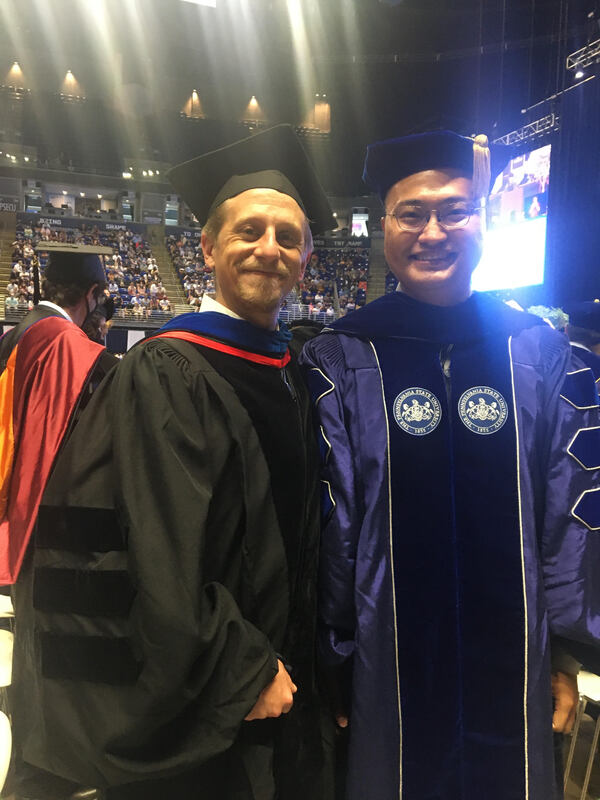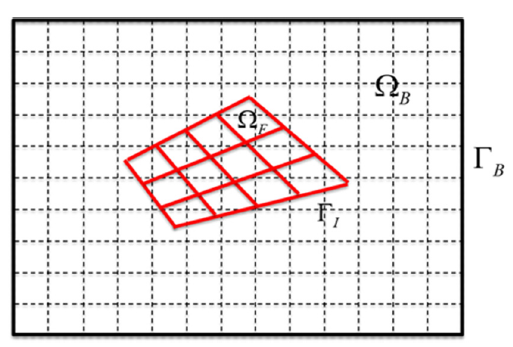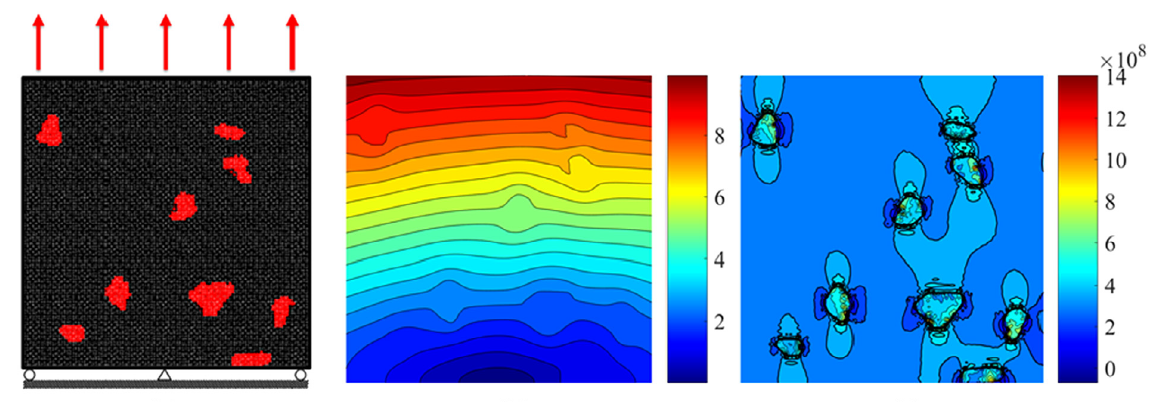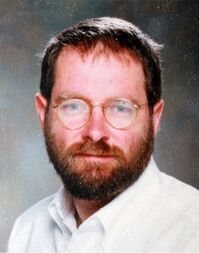|
We have a new two-part paper in Computational Mechanics published, which discusses variational consistency and efficient stabilized nodal integration (Part I) in two-field problems (thermo-elasticity and finite strain thermo-plasticity), and also using the hyperbolic thermo-mechanical theories (Part I) for time integration with a uniform O(h) time step in explicit dynamics, with results indistinguishable from the classical theory:
Hillman, M., Lin, K.C., Nodally integrated thermo-mechanical RKPM: Part I - Thermoelasticity. Computational Mechanics, 2021. https://doi.org/10.1007/s00466-021-02047-9. <Download> Hillman, M., Lin, K.C., Nodally integrated thermo-mechanical RKPM: Part II - Generalized thermoelasticity and hyperbolic finite-strain thermoplasticity. Computational Mechanics, 2021. https://doi.org/10.1007/s00466-021-02048-8. <Download>
0 Comments
Graduated my second PhD student today. I'm so proud of him. Right: Dr. Jiarui Wang! Check out his work on composite analysis here https://authors.elsevier.com/a/1dV4l_12dr5nCL…. A few more papers to come shortly!
New journal article published in CMAME on effortless (immersed) modeling of composite microstructures without tedious conforming FEM or cut quadrature cells: https://lnkd.in/eg2gvuj
New article on RKPM for shocks, published in Computational Mechanics, available online "A semi-Lagrangian reproducing kernel particle method with particle-based shock algorithm for explosive welding simulation."
In this paper we develop an algorithm that embeds shocks physics into the formulation and precludes Gibbs' phenomenon, without the need for cells. We validate it with explosive welding simulations. You can download it here. Dear Colleagues,
We cordially invite you to present your work in the thematic session “Recent Advances in Meshfree, Particle, and Peridynamics Methods” as part of COMPLAS 2021 to be held September 7th-10th in Barcelona, Spain (if this is not possible due to COVID-19, the conference will be held online). Abstract submission is open, the deadline to submit is April 9th. To be able to submit an abstract, you have to first register for the conference here (no fee required at this time): https://congress.cimne.com/complas2021/frontal/Registration.asp After you register, you will need to log in and click on “submit your contribution”. The minisyposia is listed on the “Area / MS - IS” drop-down as “IS23 - Meshfree, Peridynamics, and Particle Methods: Contemporary Methods and Applications”. Further details on the conference and abstract submission can be found at the conference website: https://congress.cimne.com/complas2021 The goal of this minisymposium is to bring together experts working on these methods, share research results and identify the emergent needs towards more rapid progress in advancing the important fields of meshfree, peridynamic and particle methods. Topics of interest for this minisymposium include, but are not limited to the following: • Fundamental developments • Handling stationary and transient strong and weak discontinuities • Formulations for extreme material distortion, fragmentation, contact and impact, and material instability • Numerical integration • Strong form collocation meshfree methods • Rank stability, kernel stability, and other stability issues • Simulation of classes of problems for which meshfree, peridynamics, and particle methods are superior to conventional mesh-based methods • Parallel-computing, scalable algorithms, and large-scale simulations • Multiple and coupled physics • Multiple time and/or length scales • Multi-phase (solid, fluid and gas) interactions • Structural responses to extreme loading conditions such as blast, impact, and penetration • Simulation of natural disasters like tsunamis, earthquakes, and landslides • Simulation of manufacturing processes • Simulation of bio and nano mechanics and material system responses We look forward to receiving your abstract submission. Best regards, Mike Hillman The Pennsylvania State University mhillman@psu.edu J. S. Chen University of California, San Diego, USA js-chen@ucsd.edu John Foster The University of Texas at Austin jfoster@austin.utexas.edu Pablo Seleson Oak Ridge National Laboratory selesonpd@ornl.gov Dear Colleagues,
We cordially invite you to present your work in the thematic session “Recent Advances and Applications in Meshfree and Particle Methods” as part of the 16th US National Congress on Computational Mechanics (USNCCM16) to be held July 25 - 29, 2021 in a hybrid format (virtual and physically in Chicago, Illinois - should the situation not allow in-person meeting, the congress will be 100% virtual). The minisymposium is listed as MS# 406 on the submission website. Abstract submission is now open. To submit an abstract, please visit:http://16.usnccm.org/ab_sub Please be aware that the deadline for abstract submission is January 15th, 2020. Further details on the conference and abstract submission can be found at the conference website:http://16.usnccm.org/ The goal of this minisymposium is to bring together experts working on these methods, share research results and identify the emergent needs towards more rapid progress in advancing the important fields of meshfree, peridynamic and particle methods. Topics of interest for this minisymposium include, but are not limited to the following:
We look forward to receiving your abstract submission. Best regards,John Foster The University of Texas at Austin jfoster@austin.utexas.edu Mike Hillman The Pennsylvania State University mhillman@psu.edu J. S. Chen University of California, San Diego, USA js-chen@ucsd.edu Zhen Chen University of Missouri, USA ChenZh@missouri.edu Dear Colleagues,
We cordially invite you to present your work in the thematic session “Meshfree, Peridynamics, and Particle Methods: Contemporary Methods and Applications” as part of the 2021 Engineering Mechanics Institute Conference (EMI 2021 – formally EMI 2020) to be held virtually only, May 25-28, 2021. The minisymposium is listed as MS 222 on the submission website. Submission of NEW abstracts is now open. To submit an abstract, please visit: https://submissions.emi2021.org If you have already submitted an abstract for EMI 2020 you do not need to do anything. If you wish to modify/update your abstract, go to https://submissions.emi2021.org NOTE: this is different from EMI 2020 site; however, your logon information remains the same. Please be aware that the deadline for NEW abstract submission is January 31th, 2021. Further details on the conference and abstract submission can be found at the conference website: https://www.emi-conference.org/ This session aims to promote collaboration among academia, government, and industry in the development and application of meshfree, peridynamics, and particle methods, to share recent advances, lessons learned, and to transfer knowledge. This minisymposium will solicit all subjects related to development of these methods, which include, but are not limited to, the following:
Best regards, Mike Hillman The Pennsylvania State University mhillman@psu.edu J. S. Chen University of California, San Diego, USA js-chen@ucsd.edu John Foster The University of Texas at Austin jfoster@austin.utexas.edu Sheng-Wei Chi University of Illinois swchi@uic.edu Pablo Seleson Oak Ridge National Laboratory selesonpd@ornl.gov On behalf of the Topic Organizers, it is our pleasure to invite you to present your research work in Session 12-28: Recent Advances and Applications in Meshfree and Particle Methods at IMECE 2020, which will be held in Oregon Convention Center, Portland, Oregon, November 16-19, 2020.
Find it on RG here, or download below. Abstract Enforcement of essential boundary conditions in many Galerkin meshfree methods is non-trivial due to the fact that field variables are not guaranteed to coincide with their coefficients at nodal locations. A common approach to overcome this issue is to strongly enforce the boundary conditions at these points by employing a technique to modify the approximation such that this is possible. However, with these methods, test and trial functions do not strictly satisfy the requirements of the conventional weak formulation of the problem, as the desired imposed values can actually deviate between nodes on the boundary. In this work, it is first shown that this inconsistency results in the loss of Galerkin orthogonality and best approximation property, and correspondingly, failure to pass the patch test. It is also shown that this induces an O(h) error in the energy norm in the solution of second-order boundary value problems that is independent of the order of completeness in the approximation. As a result, this places a barrier on the global order of accuracy of Galerkin meshfree solutions to that of linear consistency. That is, with these methods, it is not possible to attain the higher order accuracy offered by meshfree approximations in the solution of boundary-value problems. To remedy this deficiency, two new weak forms are introduced that relax the requirements on the test and trial functions in the traditional weak formulation. These are employed in conjunction with strong enforcement of essential boundary conditions at nodes, and several benchmark problems are solved to demonstrate that optimal accuracy and convergence rates associated with the order of approximation can be restored using the proposed method. In other words, this approach allows p-refinement, and h-refinement with p th order rates with strong enforcement of boundary conditions beyond linear (p > 1) for the first time. In addition, a new concept termed a-refinement is introduced, where improved accuracy is obtained by increasing the kernel measure in meshfree approximations, previously unavailable.
PSU released a story today about my CAREER award.
https://news.psu.edu/story/619318/2020/05/08/academics/civil-engineering-faculty-receives-career-award-enhance-fracture Today I learned my CAREER proposal got awarded by NSF, titled "A Hybrid Local-Nonlocal Peridynamics Framework to Model Failure Across Deformations and Strain Rates". It will focus on some fundamental work on Peridynamics, leveraging some previous work on unification of local and non-local meshfree methods presented in this paper.
This special issue is dedicated to Steve Attaway, who passed away on February 28, 2019. Steve Attaway worked at Sandia National Laboratories in Albuquerque, NM, for over 30 years making significant contributions in high-performance computing, shock physics, meshfree methods, the geosciences, concrete mechanics, and blast effects on structures. Steve’s early contributions in meshfree methods included stability analysis of smoothed particle hydrodynamics (SPH) (Swegle, J., Hicks, D., and Attaway, S., 1995, “Smoothed Particle Hydrodynamics Stability Analysis,” JCP v. 116) and the coupling of SPH with the finite element method in a massively parallel explicit dynamics framework (Attaway, S., Heinstein, M., and Swegle, J., 1994, “Coupling of smooth particle hydrodynamics with the finite element method,” Nuclear Eng. Design, v. 150). Steve understood the great potential of meshfree methods for modeling structures under extreme loading conditions including blast effects, penetration, and perforation. Steve helped bring big, seemingly impossible ideas into realization, from parallelizing the PRONTO FEA code in the early 1990s to pushing shock physics codes to run on hundreds of thousands of cores on the world’s fastest supercomputers. Throughout his career, he was recognized with awards and accolades from the Department of Energy. And yet, Steve was never focused solely on the awards, accolades, recognitions, or technical accomplishments, significant though they were. He also invested his time in training the next generation of big thinkers and problem solvers. He probably spent as much time mentoring those around him as he did relishing every opportunity to tackle the “big problems” brought to Sandia for solving. The impact and legacy of Steve Attaway was not just about his technical achievements, but how he was always willing to help, instruct, guide, direct, lead, and serve others (contributed by Joseph Bishop, Sandia National Laboratories, Albuquerque, NM).
My latest article on RKPM and peridynamics is online now, available via open-access: http://dx.doi.org/10.1007/s40571-019-00266-9
My new paper on the connection between peridynamics and RKPM (and high-order peridynamics) is accepted without revision, and will be online shortly. Stay tuned!
<Download preprint> Title Generalized Reproducing Kernel Peridynamics: Unification of Local and Non-Local Meshfree Methods, and an Arbitrary-order Accurate Generalized State-Based Peridynamic Formulation Abstract State-based peridynamics is a non-local reformulation of solid mechanics that replaces the force density of the divergence of stress with an integral of the action of force states on bonds local to a given position, which precludes differentiation with the aim to model strong discontinuities effortlessly. A popular implementation is a meshfree formulation where the integral is discretized by quadrature points, which results in a series of unknowns at the points under the strong-form collocation framework. In this work, the meshfree discretization of state-based peridynamics under the correspondence principle is examined and compared to traditional meshfree methods based on the classical local formulation of solid mechanics. It is first shown that the way in which the peridynamic formulation approximates differentiation can be unified with the implicit gradient approximation, and is this is termed the generalized reproducing kernel peridynamic approximation. This allows the construction of non-local deformation gradients with arbitrary-order accuracy, as well as non-local approximations of higher-order derivatives. A high-order accurate non-local divergence of stress is then proposed to replace the force density in the original state-based peridynamics, in order to obtain global arbitrary-order accuracy in the numerical solution. These two operators used in conjunction with one another is termed the generalized reproducing kernel peridynamic method. The strong-form collocation version of the method is tested against benchmark solutions to examine and verify the high-order accuracy and convergence properties of the method. A Non-ordinary State-based Godunov-peridynamics Formulation for Strong Shocks in Solids
Abstract The theory and meshfree implementation of peridynamics has been proposed to model problems involving transient strong discontinuities such as dynamic fracture and fragment-impact problems. For effective application of numerical methods to these events, essential shock physics and Gibbs instability should be addressed. The Godunov scheme for shock treatment has been shown an effective approach for tackling these two issues but has not been considered yet for peri-dynamics. This work introduces a physics-based shock modeling formulation for non-ordinary state-based peridynamics, in which the Godunov scheme is introduced by embedding the Rie-mann solution into the force state, resulting in a shock formulation free of tuneable parameters. Several benchmark problems are solved to demonstrate the effectiveness of the proposed formulation for modeling problems involving shocks in solids. <Download preprint> DOI link: https://doi.org/10.1007/s40571-019-00254-z Dear Colleagues:
We cordially invite you to present your work in the thematic session “Recent Advances and Applications in Meshfree and Particle Methods” as part of the 2019 International Mechanical Engineering Congress & Exposition (IMECE2019) to be held November 8-14, 2019 at Calvin L. Rampton Salt Palace Convention Center, Salt Lake City, Utah. The minisymposium is listed as 11-28 under Track 11: Mechanics of Solids, Structures and Fluids. Abstracts (presentation only) should be submitted by the deadline of July 22, 2019, at the IMECE 2019 website: https://event.asme.org/IMECE The aim of this minisymposium is to bring together experts working on these methods, share research results and identify the emergent needs towards more rapid progress in advancing the important fields of meshfree and particle methods. Topics of interest for this minisymposium include, but are not limited to the following: · Recent advances in meshfree, peridynamics, material point methods, and smoothed particle hydrodynamics · Recent advances in formulations for extreme material distortion, fragmentation, contact and impact, and material instability · Recent advances in numerical integration · Characterization and stabilization of numerical instabilities · Strong form collocation meshfree methods · Simulations involving multiple and coupled physics · Simulations involving multiple time and/or length scales · Simulation of multi-phase interactions · Simulation of structural responses to extreme loading · Simulation of microstructural behavior and microstructure evolution · Simulation of manufacturing processes · Simulation of bio and nano mechanics and material system responses · Applications of meshfree methods to simulation of natural disasters · Nonlocal mechanics and computation · New applications for which meshfree and particle methods are superior to conventional mesh-based methods · Parallel-computing, scalable algorithms, and large-scale simulations Organizers: Sheng-Wei Chi, University of Illinois, <swchi@uic.edu> J. S. Chen, University of California, San Diego, <js-chen@ucsd.edu> Mike Hillman, Pennsylvania State University, <mhillman@engr.psu.edu> C. T. Wu, Livermore Software Technology Corporation, <ctwu@lstc.com> https://www.asme.org/about-asme/news/asme-news/imece-2019-abstract-deadline-approaching Dear Friends, The Center for Extreme Events Research (CEER) is pleased to announce the new “Interdisciplinary Networking and Training in Engineering and Next-generation Simulations and Experiments” (INTENSE) Program at UC San Diego. Under this CEER INTENSE Program, four short courses will be offered during this spring and summer: COURSE 1 Introduction to Meshfree Methods: Fundamentals and Application May 13-15, 2019 (2.5 days) COURSE 2 Topology Optimization for Additive Manufacturing May 15-17, 2019 (2.5 days) COURSE 3 Advanced Composites for Aerospace Structures: Analysis, Manufacturing and Design June 24-26, 2019 (2.5 days) COURSE 4 Joining of Composite Structures June 26-8, 2019 (2.5 days) For other information and to register, please visit http://ceer.ucsd.edu/events/2019/short-course We look forward to meeting with you at UC San Diego. Center for Extreme Events Research (CEER) http://www.jacobsschool.ucsd.edu/ceer/ Jacobs School of Engineering University of California, San Diego Abstracts for USNCCM 2019 are due today!
We cordially invite you to present your work in the thematic session “Advances and Applications in Meshfree and Particle Methods” as part of the 15th US National Congress on Computational Mechanics (USNCCM15) to be held July 28 - August 1, 2019 in Austin, Texas. The minisymposium is listed as MS# 301 on the submission website. Abstract submission is now open. To submit an abstract, please visit: https://submissions15.usnccm.org/ Please be aware that the deadline for abstract submission is January 15th, 2019. Further details on the conference and abstract submission can be found at the conference website: http://15.usnccm.org/ The goal of this minisymposium is to bring together experts working on these methods, share research results and identify the emergent needs towards more rapid progress in advancing the important fields of meshfree and particle methods. Topics of interest for this minisymposium include, but are not limited to the following: • Recent advances in meshfree and particle methods, coupling of finite element and meshfree methods, smoothed particle hydrodynamics, and peridynamics • Methods coupling multiple physics and/or multiple scales • Methods of fictitious domains and non-intrusive coupling • Strong form collocation methods • Nodal integration and domain integration methods for the Galerkin formulation • Characterization and stabilization of numerical instabilities • Recent advances in modeling strong and weak discontinuities • Recent advances in modeling extreme loading events • Recent advances in modeling manufacturing problems • Recent advances in modeling bio- and nano- mechanics problems • Nonlocal mechanics and computation • Parallel computation, solvers and large-scale simulations • New applications We look forward to receiving your abstract submission. Dear Colleagues,
We cordially invite you to present your work in the thematic session “Meshfree, Peridynamics, and Particle Methods: Contemporary Methods and Applications” as part of the 2019 Engineering Mechanics Institute Conference (EMI 2019) to be held June 18-21, 2019 at the California Institute of Technology in Pasadena, California. The minisymposium is listed as MS#17 on the submission website. Abstract submission is now open. To submit an abstract, please visit: http://emi2019.exordo.com Please be aware that the deadline for abstract submission is January 30th, 2019. Further details on the conference and abstract submission can be found at the conference website: http://emi2019.caltech.edu This session aims to promote collaboration among academia, government, and industry in the development and application of meshfree, peridynamics, and particle methods, to share recent advances, lessons learned, and to transfer knowledge. This minisymposium will solicit all subjects related to development of these methods, which include, but are not limited to, the following:
We look forward to receiving your abstract submission. Best regards,Mike Hillman The Pennsylvania State University mhillman@psu.edu J. S. Chen University of California, San Diego, USA js-chen@ucsd.edu Sheng-Wei Chi University of Illinois swchi@uic.edu John Foster The University of Texas at Austin jfoster@austin.utexas.edu Pablo Seleson Oak Ridge National Laboratory selesonpd@ornl.gov One year grant: Development of a numerical method called the Discrete-Continuum Particle Method (DCPM) for simulating arbitrary three-dimensional fracture while capturing essential failure mechanisms in concrete microstructures. This new numerical method provides a novel framework for naturally converting a continuum discretization into a discrete network of arbitrary fractures with embedded contact for capturing the complex kinematics of failure in geomaterials.
Dear Colleagues: USNCCM 2019 MS on "Advances and Applications in Meshfree and Particle Methods”1/12/2019 Dear Colleagues,
We cordially invite you to present your work in the thematic session “Advances and Applications in Meshfree and Particle Methods” as part of the 15th US National Congress on Computational Mechanics (USNCCM15) to be held July 28 - August 1, 2019 in Austin, Texas. The minisymposium is listed as MS# 301 on the submission website. Abstract submission is now open. To submit an abstract, please visit: https://submissions15.usnccm.org/ Please be aware that the deadline for abstract submission is January 15th, 2019. Further details on the conference and abstract submission can be found at the conference website: http://15.usnccm.org/ The goal of this minisymposium is to bring together experts working on these methods, share research results and identify the emergent needs towards more rapid progress in advancing the important fields of meshfree and particle methods. Topics of interest for this minisymposium include, but are not limited to the following: • Recent advances in meshfree and particle methods, coupling of finite element and meshfree methods, smoothed particle hydrodynamics, and peridynamics • Methods coupling multiple physics and/or multiple scales • Methods of fictitious domains and non-intrusive coupling • Strong form collocation methods • Nodal integration and domain integration methods for the Galerkin formulation • Characterization and stabilization of numerical instabilities • Recent advances in modeling strong and weak discontinuities • Recent advances in modeling extreme loading events • Recent advances in modeling manufacturing problems • Recent advances in modeling bio- and nano- mechanics problems • Nonlocal mechanics and computation • Parallel computation, solvers and large-scale simulations • New applications We look forward to receiving your abstract submission. Best regards, C.T. Wu Livermore Software Technology Corporation, USA ctwu@lstc.com J. S. Chen University of California, San Diego, USA js-chen@ucsd.edu Zhen Chen University of Missouri, USA ChenZh@missouri.edu Sheng-Wei Chi University of Illinois, USA swchi@uic.edu Mike Hillman The Pennsylvania State University, USA mhillman@psu.edu Marc Alexander Schweitzer University of Bonn and Fraunhofer SCAI, Germany schweitzer@ins.uni-bonn.de Dongdong Wang Xiamen University, China ddwang@xmu.edu.cn My first NSF project has been awarded. My collaborator is Jing Du of Mechanical and Nuclear Engineering here at Penn State. The project is on a combined computational-experimental approach to studying fracture in polymer-ceramic composites.
The deadline for submission for Meshfree and Particle Methods: Applications and Theory September 10-12, 2018 in Santa Fe, New Mexico has been EXTENDED to June 15, 2018. The abstracts can be submitted at the following webpage:
http://mfpm2018.usacm.org/abstract_sub I would like to invite you all to submit an abstract to the topic "Penetration and Perforation" You are also welcome to submit to any of the focus areas:
Abstract submission deadline June 15: Meshfree and Particle Methods: Applications and Theory6/11/2018 I would like to invite you all to submit an abstract to the topic "Penetration and Perforation" at the conference Meshfree and Particle Methods: Applications and Theory September 10-12, 2018 in Santa Fe, New Mexico.
Details of the conference can be found here: http://mfpm2018.usacm.org The deadline for submission is June 15, 2018. The abstracts can be submitted at the following webpage: http://mfpm2018.usacm.org/abstract_sub You are also welcome to submit to any of the focus areas:
Here's a summary of the talks, conferences and workshops going on this summer and fall I'm involved with or giving talks at:
2018 Engineering Mechanics Institute Conference, Cambridge, Massachusetts, May 29-June 1, 2018. I'll be giving a talk in "Meshfree, Peridynamics, and Particle Methods: Contemporary Methods and Applications," on Peridynamics, two of my students will give talks too. This will be a great session bringing together the Galerkin- and strongform-based meshfree methods and the Peridynamics community. My talk will discuss how these two methods are related. I'm co-organizing this session, but submission is closed. 18th U.S. National Congress for Theoretical and Applied Mechanics, Chicago, Illinois, June 4-9, 2018. I'll be giving a talk in "Simulation-based Engineering for Structure Resilience to Disastrous Events" on a new meshfree implementation of RKPM which is stable and accurate without corrections. Submission is closed on this conference. 2018 World Congress on Computational Mechanics, New York, New York, July 22-27, 2018. I'll be giving a talk in "Advances and Applications in Meshfree and Particle Methods," about Peridynamics, my students will also give two talks. My post doc will give a talk in "New Trends in Extreme Events Modeling," on shock modeling in Peridynamics, I'm co-organizing "New Trends in Extreme Events Modeling," however submission is closed. Meshfree and Particle Methods: Applications and Theory, Sante Fe, New Mexico, September 10-12, 2018. Submission open until June 15, 2018, Meshfree workshop at UCSD August time-frame. More details to come. 2018 ASME International Mechanical Engineering Congress, Pittsburgh, Pennsylvania, November 9-15, 2018. I'll be giving a talk in "Recent Advances and Applications in Meshfree and Particle Methods," I'm co-organizing this session as well. Submission closes July 23, 2018.3, 2018 |
Archives
August 2021
Categories |
||||||||







 RSS Feed
RSS Feed